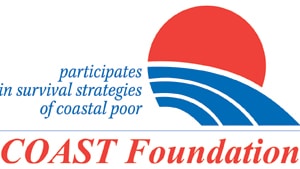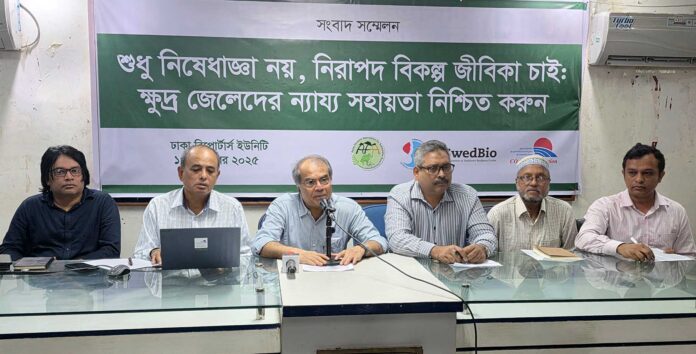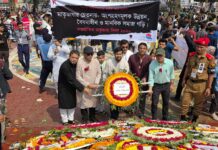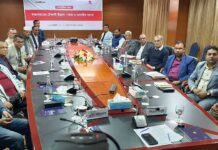Dhaka, 13 October 2025: COAST Foundation today organized a national press conference at the Dhaka Reporters Unity titled “Not Just Imposing Fishing Ban, We Demand Safe Alternative Livelihoods to Ensure Equitable Support for Small-scale Fishers.”
Speakers expressed concern over the decline of Hilsa catch, delays in support distribution, recurring natural disasters, lack of alternative income, biodiversity degradation, privatization of fishing zones, and rising informal debt bondage, which have trapped fisher communities in deep socioeconomic hardship. They urged the government to ensure timely support and expand IGA (Income Generating Activities) programs for small-scale fishers, especially women and youth, alongside transparent selection and distribution processes.
M Rezaul Karim Chowdhury, Executive Director, COAST Foundation, and Chief Convenor, BDCSO Process, moderated the event. He said, “Fishing bans are essential for Hilsa regeneration, but they cannot mean hunger. The government must provide 40 kg rice and BDT 8 thousand to every registered fishing household before the ban starts and ensure IGA-based work for at least one family member.” He also urged to provide vocational training to the youth fishers for finding alternative IGA. He noted that the Manta Fishers (the fishers live in the small boats in the canals or small rivers) must have the fisher’s cards and keep them out of the fishing ban.
Sanat Kumar Bhowmik, Deputy Executive Director, COAST Foundation, presented the keynote paper. He revealed that 56% of small-scale fishers remain excluded from government aid, while 83% receive assistance 1-2 months after the ban period ends. Moreover, 87% have no access to IGA or skill development programs, and 70% remain trapped in informal, exploitative loans, often forcing them to fish illegally for survival. He noted that domestic violence in fishing families increases by 30–40% during ban periods due to financial stress. He also emphasized strict action against illegal nets and a complete ban on net-producing factories.
Mustafa Kamal Akanda, Director-Admin, COAST Foundation, called rearing livestock, aquaculture, and small entrepreneurship for women and youth also to be involved in fish processing chain. He stressed the need for the immediate identification and update of the national fishers’ database, accessible credit and grant schemes during the fishing bans to keep families stable.
Khandoker Faruque Ahmed, Executive Director, Trinamool Unnayan Sangstha, said, “Food security and livelihood protection must be institutionalized alongside conservation. He mentioned that justice to fishers is key to sustainability.”
Md. Abul Hasan, Head of Climate Change & Resilience, COAST Foundation, added, “Small-scale fishers are at the frontline of climate change. Hilsa decline is linked to destructive fishing, unplanned dredging, and power plant expansion in coastal sanctuaries. He pointed out that a dedicated development fund for alternative livelihoods are urgent.”
Md. Zahidul Islam, Head of MEAL & Social Development, COAST Foundation, shared findings showing a 3.4% decline in Hilsa catch over the last five years. He noted that engaging women and youth in IGA initiatives could significantly strengthen household resilience. He also stressed the need to reclassify the Hilsa fish, traditionally caught in rivers, as an inland fish under WTO guidelines to protect it from marine subsidy restrictions.
Speakers collectively called for timely food & money distribution, inclusive IGA opportunities, low-interest credit, and equitable inclusion of marginalized fishing communities in all government programs to ensure that no fisher family goes hungry during fishing bans.
Download related document [Bangla Press] [English Press] [Position Paper] [Presentation]
Photos
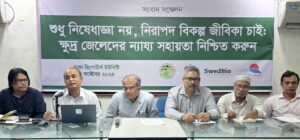 |
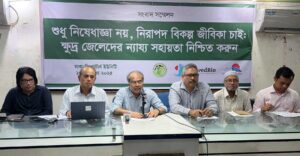 |
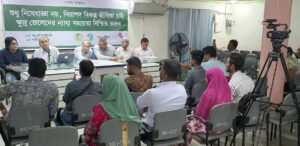 |
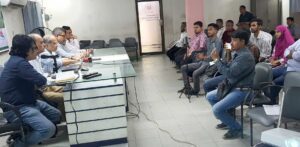 |
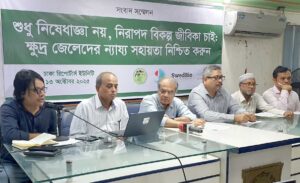 |
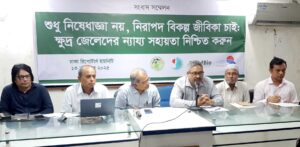 |
 |
Newslink
 |
 |
 |
|
 |
 |
 |
 |
 |
 |
 |
 |
 |
 |
 |
 |
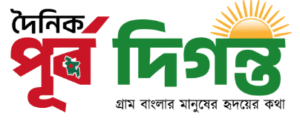 |


